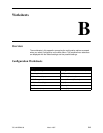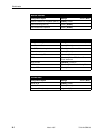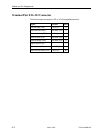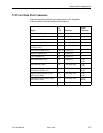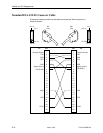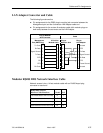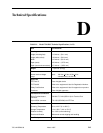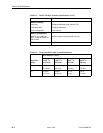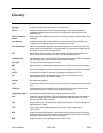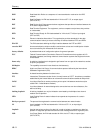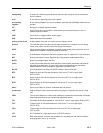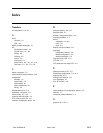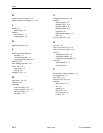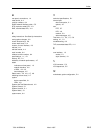
Glossary
GL-3
7510-A2-GB20-00
March 1997
A method for interleaving several access channels onto a single circuit for transmission
over the network.
A connection or switching point on the network.
A non-latching loopback can only be initiated or terminated by the 56 kbps network service
provider.
No Signal. A network-reported condition.
Out Of Frame. An error condition in which frame synchronization bits are in error. A
network-reported condition.
Out of Service. A digital network trouble signal.
Packet Assembler/Disassembler.
A data network circuit with one control and one tributary device.
The rules that govern how devices exchange information on a network. It covers timing,
format, error control, and flow control during data transmission.
Public Switched Telephone Network. A network shared among many users who can use
telephones to establish connections between two points.
A reinitialization of the device that occurs at power-up or in response to a reset command.
Routing Information Protocol. Specifies the routing protocol used between DSUs.
Receive Line Signal Detect. See CD.
A device that makes decisions about the paths network traffic should take and forwards
that traffic to its destination. A router helps achieve interoperability and connectivity
between different vendor’s equipment, regardless of protocols used.
An EIA standard for the 25-pin DCE/DTE interface. Same as EIA-232.
Request to Send. An EIA-lead standard for V.24 circuit CT 105; an input signal
(DTE-to-DCE).
Received Clock. An EIA-lead standard for V.24 circuit CT 115; an output signal
(DCE-to-DTE).
Received Data. An EIA-lead standard for V.24 circuit CT 104; an output signal
(DCE-to-DTE).
Synchronous Data Link Control. A standard data link protocol.
Data transmission that is synchronized by timing signals. Characters are sent at a fixed
rate.
Time Division Multiplexer. A device that enables the simultaneous transmission of multiple
independent data streams into a single high-speed data stream.
Test Mode. An EIA-lead standard for V.24 circuit CT 142; an output signal (DCE-to-DTE).
Transmit Clock. An EIA-lead standard for V.24 circuit CT 114; an output signal
(DCE-to-DTE).
Transmit Data. An EIA-lead standard for V.24 circuit CT 103; an input signal
(DTE-to-DCE).
ITU-T standard for a high-speed, 34-pin, DCE/DTE interface.
Wide Area Network. A network that operates over long distances and spans a relatively
large geographic area (e.g., a country).
multiplexing
node
non-latching
loopback
NS
OOF
OOS
PAD
point-to-point circuit
protocol
PSTN
reset
RIP
RLSD
router
RS-232
RTS
RXC
RXD
SDLC
synchronous
TDM
TM
TXC
TXD
V.35
WA N




